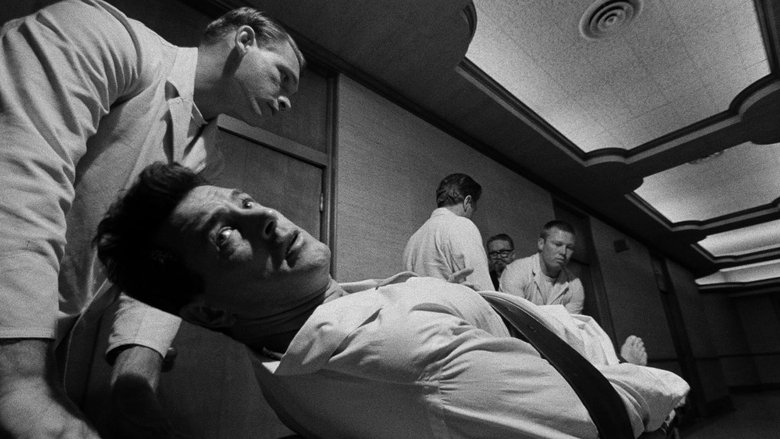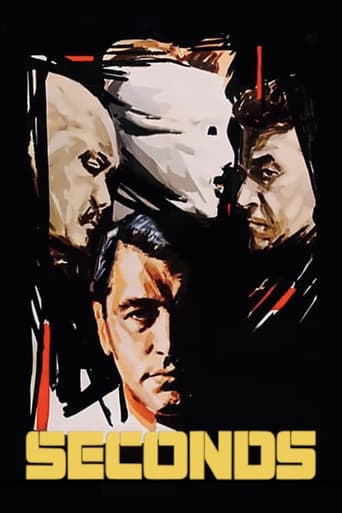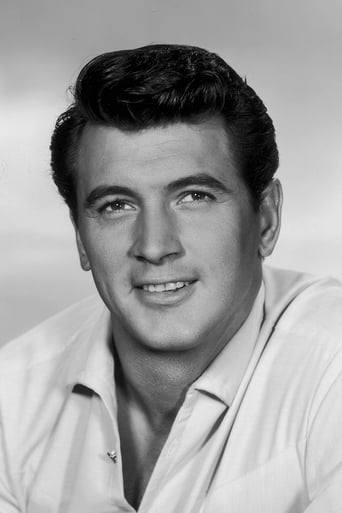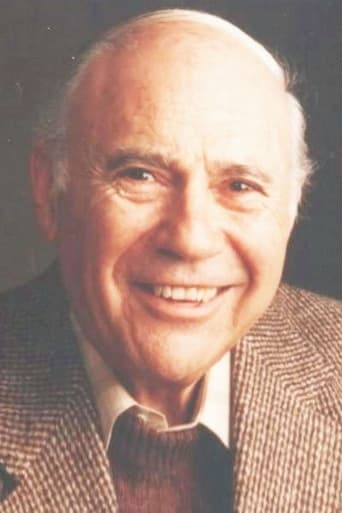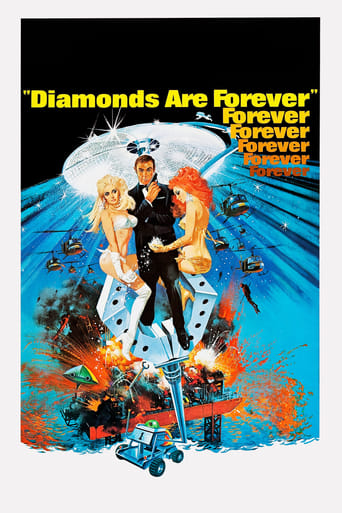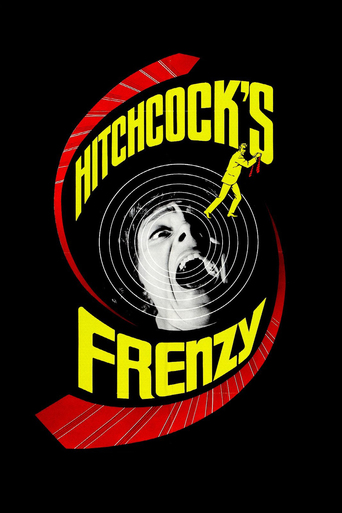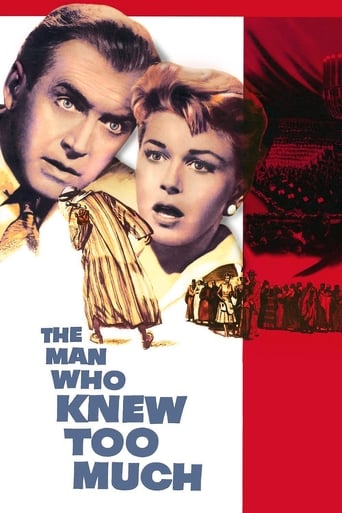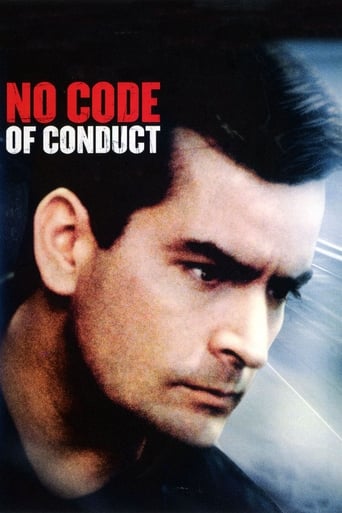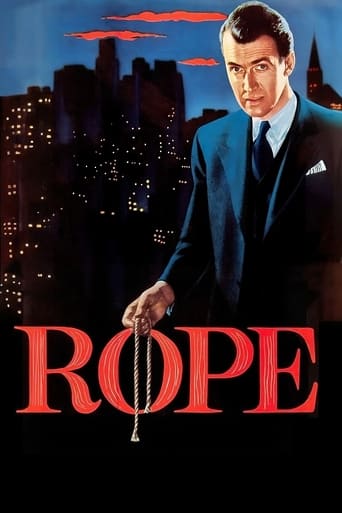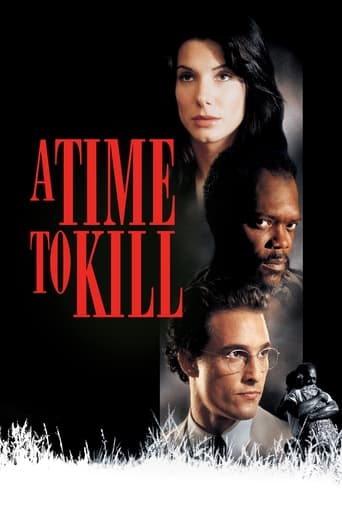Seconds (1966)
An unhappy middle-aged banker agrees to a procedure that will fake his death and give him a completely new look and identity – one that comes with its own price.
Watch Trailer
Free Trial Channels
Cast


Similar titles
Reviews
Takes itself way too seriously
Plot so thin, it passes unnoticed.
Perfectly adorable
A clunky actioner with a handful of cool moments.
During an interview with Richard Anderson, he tells the interviewer to watch Seconds, as it's a great film. Richard plays the doctor, and his screentime is very limited, however great of an actor he is. With due respect to the director's decision to cast another very fine actor as the lead character, I do wish that the director had cast Richard Anderson as the lead character, who seeks a new life. Richard's looks and physique would have made the transition into Rock Hudson more believable: different enough to support the story line of plastic surgery. Also, it would make more sense when the lead character's wife is trying to initiate lovemaking in the beginning of the film. Again, the lead actor is fine. But Richard had the charisma and appeal that would have strengthened the scene. So, this great movie, could have been very great with Richard in the lead role.
The final chapter of director John Frankenheimer's paranoia trilogy (after THE MANCHURIAN CANDIDATE 1962 and SEVEN DAYS IN MAY 1964), SECONDS posits the possibility of a second chance to start one's life with a clean slate, through proper plastic surgeries and a fake death, and our protagonist is a 51-year-old bank manager Arthur Hamilton (Randolph, cogently laying bare his ambivalence concerning the wacky proposition), who is consequentially, reborn as Tony Wilson (Hudson), assumes his hobbyhorse as an amateur painter, lives in his seaside studio and falls in with new female acquaintance. But soon his past catches up with him, because needless to say, plastic surgeries can only offer a new physiognomy and there is the conspicuous loophole in the undertaking if a reborn's previous memory wouldn't be obliterated, the promised new life would very probably ends up like Fata Morgana. With the missing link of amnesia, the story doesn't live up to the scrutiny of its intrinsic logic, for one thing, there is no clear justification of why Tony insists on taking another new identity in the third act, it is not the mutable outlook which hinders a reborn's fresh start, but some ingrain factors that cannot be modulated by surgeries, which renders Tony's desperate action arbitrary and its consequence moot. Also, the story heedfully skirts around the process of rejuvenation, Hudson is a decade younger than Randolph, so what special regiment does Arthur must undergo in order to attain the corporeal sea change (no liposuction is mentioned)? We would never know.Above-mentioned gripes aside, SECONDS is commendable even it is solely for the avant-garde monochromatic cinematography from Hollywood doyen James Wong Howe (justly accorded with an Oscar nomination even the film was tanked upon its release), his camera angles are often oddly askew and heightened close-ups are put into extensive use in conveying through a distorted point-of-view that something is terribly amiss, underpinned by Jerry Goldsmith's mind-bending incidental music, together they constitute a sterling oracular-and-aural combo to stagger the audience witless. Rock Hudson, mining his own faculty in a genre he rarely sinks his teeth into, stoutly brings about a sympathetic commitment to the downward spiral of Tony's mental agony on top of the tall-tale's ineffectual effort to purport its legitimacy, and a grace note is the sign-of-the-times grape-stomping hippie frolic when Tony whiles away time with Nora Marcus (a mettlesome Salome Jens) in his ephemeral embrace of euphoria, which only to be dashed a moment later, to ascertain that living the life of Riley has its insurmountable underside, a mythos forcibly culminated in its preposterous finale (a lingering question is why Tony cannot just decamp and live somewhere else afresh?), for what it is worth, SECONDS is erring on the side of its cautionary-tale tantalization to mire its protagonist in the venal corporation whereas ostensibly astute alternatives are conveniently on tap elsewhere.
I don't think the movie's definition of 'reborn' is exactly what the popular meaning has in mind. Nevertheless, it's a heckuva sci-fi movie from beginning to end. Frankenheimer pulls out all the stops in his camera work. The angles and effects are weird even for the close-ups, while that hectic bacchanal still has me panting for breath. We're kept off balance the whole time by those angles, which is as it should be. The style fits the material perfectly.Poor Arthur (Randolph). He's a dutiful husband and breadwinner, but he's also terminally bored with his life and wife. It seems he's grown old, even at middle-age. So, now he's ready for the big change the Company provides for a price. Still, he should have known when he signed up that he was in for the wrong kind of rebirth. After all, he first has to go through an infernal steam cloud at the pants presser, then through carcass-strewn meat lockers in a slaughterhouse. It's all this just to get to the Company offices. That should have told him that the price of a new identity would be more hellish than the 30,000 in dollars.But then, what guy wouldn't trade a 45-year old tired mug for Rock Hudson's handsome features and a new chance at life, especially the swinging kind. Okay, so maybe there's something sinister behind the smiling bureaucrats of The Company, especially when Mr. Ruby (Corey) scarfs down the fleshy edibles. But not to worry, they'll fake his death with some poor soul's cadaver and his unexciting former life will be left behind for good. So, after a lot of bloody plastic surgery, Arthur gets his new chance with a handsome new face, reborn now as Tony Wilson (Hudson). Plus he gets to move from his boring old house in the suburbs to where else but swinging Malibu, CA. The Company, it seems, fixes up everything. Then there's that adoring young playmate to help (Jens) him settle in. She's sure a long way from the drab wife he's left behind. Okay, maybe there's something odd about John (Addy), the hovering house servant of his beach cottage. Nonetheless, he waits on Tony's every need, and now Tony can live life as a king.And get a load of those merry- making hippies snaking up the canyon to their wine-soaked retreat that Nora's roped him into. Trouble is you can change a person outwardly, but it's not so easy inwardly. Besides, as Arthur, Tony has a whole lifetime of habits and hang-ups to overcome. So now he just sort of stands there, uptight, amid all the naked wine-stomping bodies. A real party-pooper until playmate Nora strong-arms him into drunken abandon. Now he's got what he thinks he wants, a new swinging life to replace the glum old businessman. At last, life is good, but is it. I'm not surprised the film has a big cult following. On the whole, it's that good. The cast is superb, even Hudson who I suspect gives a career performance. That's along with the Walton's Will Geer as the kindly old head of The Company, his perpetual smile a mask for what turns out to be a Faustian bargain. To me, the movie's final third lacks the kind of clarity that's gone before. But maybe that's as it should be. That way the sinister undercurrents remain clouded in their exact depths.It appears the plot pivots at this point on the question of personal choice, certainly a defining feature of personal fulfillment. But without giving away too much, it seems The Company has engineered everything, right down to guaranteed unhappiness. So the Company program perhaps amounts to a recycling of clients through pre-planned stages that Tony too must go through. The movie doesn't spell out what The Company is really up to; instead, we have to piece things together. I guess my only gripe is with the ending. Frankly, the kicking and screaming may raise the viewer's dread-level, but I think the ending should come as a sudden surprise with kindly old Will Geer looking on.Nonetheless, the movie appears to be an original reworking of the Faustian legend of selling one's soul. But whether taken as a Faustian parable on middle- class discontent or not, it's still a riveting 100-minutes.
The movie that Rock Hudson considered to be a horror story and a big gamble for his otherwise steely screen persona, Seconds from 1966 is a stark black-and-white parable o the dangers of wishful thinking. A dark side to the same theme that made It's a Wonderful Life so potent a story for the working class, Seconds makes the same statement for the urban professional who after climbing the corporate ladder to succeed finds himself deplete of the very thing he was competing for, namely his vitality.Next in line for the top job at his bank, Antiochus 'Tony' Wilson (Rock Hudson) is disturbed when he gets a late night phone call from his old tennis buddy and school chum whom he thought was dead for many years. What he discovers is an organization that will give him a new youthful life and lifestyle for a fee, and he accepts after some coercion. Tony gets a new life but finds an empty existence inside him after he has left his wife and old comfortable surroundings. When he requests to return to his former life and start over he finds that those in charge demand an even higher sacrifice than he had imagined.This is one of those dark films that stand today as one of the landmarks of the sixties, when real disappointment was rising in the working class, and those dropouts from society who saw the formal institutions of home and family and career as vapid social constructs. It's a bold statement, a protest film in a way because it highlights how society functions on a base of empty values, yet the filmmakers offer no real alternative. When Tony attempts to recover his place and start again, the organization demands severe loyalty.There's also the supposedly "new" community that Tony enters. As an artist, he lives the free-spirited life admired by all his neighbors. The real test comes when he is required to follow though with his new identity, something in which he discovers is to demanding to support. Knowing what we know today about Rock Hudson, the layers of meaning in the film run deep making this one of those quintessential Hudson vehicles for any academics classroom.The stark imagery highlights the noir qualities of the film. This is certainly film noir at it's most existential, as the fantasy-like atmosphere of the world of the film contains enough everyday trappings to keep us identifying with the characters, even as the action veers off kilter and meta-horror situations occur.

